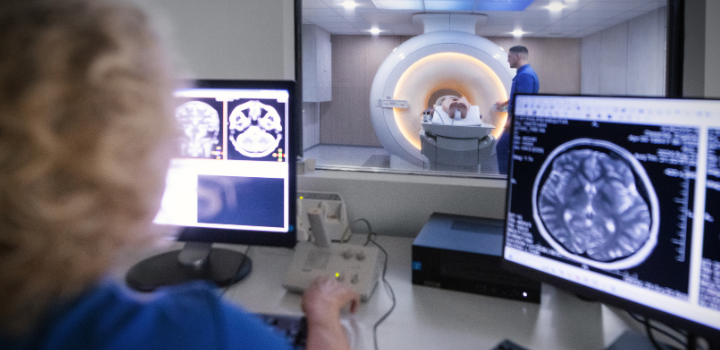Research discovery could lead to personalised treatment for people with multiple sclerosis (MS)
By: Communications

Research published today could help neurologists in the future prescribe personalised treatment to people living with multiple sclerosis (MS), after scientists studied more than half a million brain cells.
Currently, MS treatments target immune cells in the blood, stopping them from reaching the brain and causing damage. These are very effective in the early phase of MS.
But to help treat patients when their MS is more progressive, researchers need to find treatments that act on the brain cells themselves.
However, there is limited understanding of how brain cells are affected in people with MS over their lives or why there is a huge diversity in how the condition affects people.
Now, an international research team, including researchers from the University of East Anglia (UEA) and the University of Edinburgh, have worked together to create an ‘atlas of MS brain cells’ – by looking at the largest ever number of post-mortem brains from people with MS.
This included tissue donated to the MS Society Tissue Bank. The research team used this atlas to unlock findings that might improve how we find, test and prescribe new MS treatments in progressive MS.
The researchers, including MS Society funded scientists within the Edinburgh Centre for MS Research, made the exciting discovery after looking at the genes being expressed in the brain cells of people with MS.
With this information, researchers were able to separate people with MS into four groups, each with a different pattern of brain cell responses to MS. They think that each group may respond to treatments differently.

Research like this could pave the way for more personalised treatment of MS. This means using information about an individual’s MS to tailor their treatment, rather than using a one-size-fits-all approach. This approach is already used in some types of cancer.
Co-author Prof Charles ffrench-Constant, of UEA’s Norwich Medical School, said: "Our identification of subgroups of MS patients is a vital step in the discovery of effective regenerative therapies for progressive disease.
“At the moment, a major concern of those of us hunting for new therapies is that, even if a new treatment works, the benefit is not seen in the complete trial analysis because it only happens in a subgroup of the patients.
“As a result, the development work of a potentially valuable drug is discontinued by the companies involved. With an understanding of MS subgroups based on the molecular pathology patterns we have discovered, we can now seek ways to identify exactly the right people for each trial and make sure that effective therapies are not lost from the drug discovery process.”
MS affects over 150,000 people in the UK, with most expecting to develop a progressive form of the condition. It can be debilitating, exhausting and unpredictable, and currently there are thousands of people without treatment.
Graeme Hutton, 60, from Dundee, has lived with MS for more than 30 years. About 15 years ago he was told his MS had become secondary progressive, and he’s been a full-time wheelchair user for almost a decade. There are currently no treatments available for the type of MS Graeme has.
The father of three, who’s a Professor of Architecture and Deputy Dean of Duncan of Jordanstone College of Art & Design (DJCAD) at the University of Dundee, said: “I’ve met a number of people with MS over the years and the one thing we’ve got in common is that we’re all different.
“All our symptoms are different, we behave differently, and we react differently to things such as temperature. It’s clear that one size doesn’t fit all.
“At the moment the number of treatments available for progressive MS feels extremely limited. And you tend to only qualify for one of the treatments, or none in my case.
“It’s pretty dispiriting, particularly if you’re newly diagnosed with a progressive stage of the illness, to know there’s nothing ahead of you in terms of treatments.
“It’s really good to hear the researchers have identified these differences between us, and that treatments will hopefully be more tailored in the future. Knowing you can have a treatment that’s a little bit more bespoke won’t just make you physically better, it will also make you feel better, mentally.”
Anna Williams, Professor of Regenerative Neurologyat the University of Edinburgh and study lead, says: “This is such an important discovery as it tells us that we can put people with MS into subgroups according to what’s going on in the brain at a molecular level. And these subgroups might respond to therapies differently.
“So far, we have observed these subgroups using post-mortem brain tissue. To help treat MS, we need to work out how to group people with MS using blood tests. We could then design clinical trials specifically for these subgroups, which could help us get the right drugs to the right people.”
Dr Clare Walton, Head of Research at the MS Society, says: “Over 150,000 people live with MS in the UK, but a huge area of unmet need is treatments for the progressive form of the condition. One potential reason that trials haven't shown an impact on clinical disability, despite promising lab results, is that there is a huge diversity in how the condition affects people.
“We’re really grateful to the people with MS who donated their brains to science, and thanks to this international research effort, we are now starting to understand the biological basis for this variability.
“Building on these findings we can hopefully improve trials and find tailored treatments. Ultimately, it could help us move to personalised medicine – something that has revolutionised the cancer field.”
For more information and to help fund essential MS research visit www.mssociety.org.uk/stop-ms
‘snRNA-seq stratifies multiple sclerosis patients into distinct white matter glial responses’ is published in Neuron.
Related Articles

UEA launches study after supplement shows promise in professional racing drivers
Researchers at the University of East Anglia (UEA) are launching a new study to see whether American ginseng extract could boost brain health.
Read more
UEA to receive share of £15 million funding boost for region
University of East Anglia researchers have been awarded a share of £15.3 million to tackle real-world health and care challenges across the region and beyond.
Read more
MRI scan breakthrough could spare thousands of heart patients from risky invasive tests
Doctors may soon be able to tell just how sick a heart failure patient really is by using a routine MRI scan, thanks to new research from the University of East Anglia (UEA).
Read more